No edit summary |
(→Book appearances: Grover Goes to School was published in 1982, so I changed the date and moved it.) Tag: sourceedit |
||
| (14 intermediate revisions by 7 users not shown) | |||
| Line 1: | Line 1: | ||
{{performer-voice|Matt Robinson}} |
{{performer-voice|Matt Robinson}} |
||
| − | [[Image:RooseveltFranklin.jpg| |
+ | [[Image:RooseveltFranklin.jpg|thumb|300px]] |
{{am|Reddish-Magenta}} |
{{am|Reddish-Magenta}} |
||
| − | [[Image: |
+ | [[Image:RooseveltR.jpg|thumb|300px]] |
| + | [[Image:Susan_Gordon_Roosevelt_Franklin.jpg|thumb|300px|[[Susan]] ([[Loretta Long]]) and Matt Robinson (Gordon) with Roosevelt and his mother.]] |
||
| ⚫ | |||
| + | |||
| − | [[File:RooseveltFranklinSSMagFebruary1971.jpg|thumb|300px|Roosevelt Franklin with his mother in the February 1971 issue of ''[[Sesame Street Magazine]]''.]] |
||
| − | '''Roosevelt Franklin''' appeared on ''[[Sesame Street]]'' from [[Season 1]] (1970) to [[Season 7]] (1975). It goes without saying that his name is simply a reversal of that of president Franklin D. Roosevelt. The precocious Roosevelt Franklin attended [[Roosevelt Franklin Elementary School]], where he taught the class as often as not. He taught concepts like family, pride, respect, geography and not drinking poison. Roosevelt was a cool kid who loved to scat, rhyme and sing the blues. [[Roosevelt Franklin's Mother|His mother]] was proud of him. |
+ | '''Roosevelt Franklin''' appeared on ''[[Sesame Street]]'' from [[Season 1]] ([[1970]]) to [[Season 7]] ([[1975]]). It goes without saying that his name is simply a reversal of that of president Franklin D. Roosevelt. The precocious Roosevelt Franklin attended [[Roosevelt Franklin Elementary School]], where he taught the class as often as not. He taught concepts like family, pride, respect, geography and not drinking poison. Roosevelt was a cool kid who loved to scat, rhyme and sing the blues. [[Roosevelt Franklin's Mother|His mother]] was proud of him. |
In addition to his elementary school, he had his own stadium, Roosevelt Franklin Stadium, where he coached Headball. Roosevelt has a younger sister, who wishes that she could go to school like he does. <ref>''[[:Image:Dayonsesamestreet.jpg|A Day on Sesame Street]]'', [[Western Publishing]], 1979. Drawings by [[Irra Duga]].</ref> |
In addition to his elementary school, he had his own stadium, Roosevelt Franklin Stadium, where he coached Headball. Roosevelt has a younger sister, who wishes that she could go to school like he does. <ref>''[[:Image:Dayonsesamestreet.jpg|A Day on Sesame Street]]'', [[Western Publishing]], 1979. Drawings by [[Irra Duga]].</ref> |
||
| Line 23: | Line 23: | ||
{{quote|Even a cursory analysis of the preceding transcription reveals that Matt Robinson and [[Loretta Long]] do not employ Black Language in portraying Roosevelt and his mama. Usages such as "she says" (versus "she say"), "who was to blame" (versus "who be to blame" and "an ''L''" (versus "a ''L''") make it apparent that the producers of ''Sesame Street'' confuse Black Language with what William Stewart describes as a "stage Negro dialect" which "... is little more than standard English with a slightly ethnicized or southernized pronunciation, reinforced by insertion of such general nonstandardisms as ''ain't'' and the double negative, and perhaps a sprinkling of southern or inner-city Negro lexical usages like ''honey child'' or ''man''."<br><br>The fact that Roosevelt says "po'rly" or that Mama says "right on" (a phrase whose cultural-linguistic significance has been destroyed through its co-optation by whites) or that southernized inflections are employed in portraying these characters does not make them Black Language speakers...<br><br>It becomes apparent that it is unreasonable to assume that any educational program devised by the oppressor can do anything other than serve his interests... The only effective educational program for the majority of Black children in this country must be one devised and controlled by Blacks who, although having acquired certain technical skills, continue to identify with the interests of the Black masses rather than with European interests. Language intervention programs like ''Sesame Street'' are merely deterrents or detours on the road to this goal. <ref>Stewart, Barbara H. "[http://books.google.com/books?id=tzkDAAAAMBAJ&pg=PA18&dq=muppet&hl=en&ei=9tEvTOv-C4rGnAfLzMWKBA&sa=X&oi=book_result&ct=result&resnum=62&ved=0CN0CEOgBMD0#v=onepage&q=muppet&f=false ''Sesame Street'': A Linguistic Detour for Black-Language Speakers]", ''Black World''. August 1973.</ref>}} |
{{quote|Even a cursory analysis of the preceding transcription reveals that Matt Robinson and [[Loretta Long]] do not employ Black Language in portraying Roosevelt and his mama. Usages such as "she says" (versus "she say"), "who was to blame" (versus "who be to blame" and "an ''L''" (versus "a ''L''") make it apparent that the producers of ''Sesame Street'' confuse Black Language with what William Stewart describes as a "stage Negro dialect" which "... is little more than standard English with a slightly ethnicized or southernized pronunciation, reinforced by insertion of such general nonstandardisms as ''ain't'' and the double negative, and perhaps a sprinkling of southern or inner-city Negro lexical usages like ''honey child'' or ''man''."<br><br>The fact that Roosevelt says "po'rly" or that Mama says "right on" (a phrase whose cultural-linguistic significance has been destroyed through its co-optation by whites) or that southernized inflections are employed in portraying these characters does not make them Black Language speakers...<br><br>It becomes apparent that it is unreasonable to assume that any educational program devised by the oppressor can do anything other than serve his interests... The only effective educational program for the majority of Black children in this country must be one devised and controlled by Blacks who, although having acquired certain technical skills, continue to identify with the interests of the Black masses rather than with European interests. Language intervention programs like ''Sesame Street'' are merely deterrents or detours on the road to this goal. <ref>Stewart, Barbara H. "[http://books.google.com/books?id=tzkDAAAAMBAJ&pg=PA18&dq=muppet&hl=en&ei=9tEvTOv-C4rGnAfLzMWKBA&sa=X&oi=book_result&ct=result&resnum=62&ved=0CN0CEOgBMD0#v=onepage&q=muppet&f=false ''Sesame Street'': A Linguistic Detour for Black-Language Speakers]", ''Black World''. August 1973.</ref>}} |
||
| + | <br clear="all" /> |
||
| − | |||
==Sketches== |
==Sketches== |
||
| − | For sketches at his school, see [[Roosevelt Franklin Elementary School]]. |
+ | :''For sketches at his school, see [[Roosevelt Franklin Elementary School]].'' |
{| border=1 cellspacing=0 cellpadding=8 valign=top |
{| border=1 cellspacing=0 cellpadding=8 valign=top |
||
|- bgcolor=#eeeeee |
|- bgcolor=#eeeeee |
||
| − | ! Picture !! Theme |
+ | ! Picture !! Theme / [[Muppet Wiki:Earliest Known Appearance|EKA]] !! Description |
|- |
|- |
||
| [[Image:noimage.png|100px|center]] |
| [[Image:noimage.png|100px|center]] |
||
| − | | Roosevelt Franklin spells his name |
+ | | align=center | Roosevelt Franklin spells his name<br />[[Episode 0261]] |
| − | | align=center | [[Episode 0261]] |
||
| [[Susan]] helps [[Oscar the Grouch|Oscar]] read the poor handwriting on one envelope (for Oscar's postal service), and helps him deliver it to Roosevelt Franklin. She then helps Roosevelt sing a song about spelling his name. |
| [[Susan]] helps [[Oscar the Grouch|Oscar]] read the poor handwriting on one envelope (for Oscar's postal service), and helps him deliver it to Roosevelt Franklin. She then helps Roosevelt sing a song about spelling his name. |
||
| − | |- |
||
| − | | [[Image:noimage.png|100px|center]] |
||
| − | | Morty Moot Mope |
||
| − | | align=center | [[Episode 0534]] |
||
| − | | Roosevelt Franklin tells the story of an old king named Morty Moot Mope, from the kingdom of Boebitty Bope, who loves to hear words that sound the same. |
||
|- |
|- |
||
| [[Image:Hardheadhenry.jpg|200px|center]] |
| [[Image:Hardheadhenry.jpg|200px|center]] |
||
| − | | Headball: Hard Head Henry Harris |
+ | | align=center | Headball: Hard Head Henry Harris<br />[[Episode 0986]] |
| ⚫ | | [[Hard Head Henry Harris]], coached by Roosevelt Franklin, participates in Headball and must answer the question, "Where is bread made?". The headball is held at Roosevelt Franklin Stadium. Audience members include [[Bert]], [[Guy Smiley]], [[Simon Soundman]], [[Biff]], [[Sully]], [[Grover]], [[Herry Monster]] and [[Count von Count]]. |
||
| − | |[[Episode 0986]] |
||
| ⚫ | |[[Hard Head Henry Harris]], coached by Roosevelt Franklin, participates in Headball and must answer the question, "Where is bread made?". The headball is held at Roosevelt Franklin Stadium. Audience members include [[Bert]], [[Guy Smiley]], [[Simon Soundman]], [[Biff]], [[Sully]], [[Grover]], [[Herry Monster]] and [[Count von Count]]. |
||
|- |
|- |
||
| [[Image:Noimage.png|100px|center]] |
| [[Image:Noimage.png|100px|center]] |
||
| − | | Headball: Baby Breeze |
+ | | align=center | Headball: Baby Breeze<br />[[Episode 1146]] |
| − | |[[Episode 1146]] |
||
|Baby Breeze participates in Headball. |
|Baby Breeze participates in Headball. |
||
| − | |- |
||
| − | | [[Image:noimage.png|100px|center]] |
||
| − | | Same Sound Brown |
||
| − | | |
||
| − | |Roosevelt sings about his friend, [[Same Sound Brown]], who can rhyme faster than anybody else that he knows. {{Sketchrelease|Publications: ''[[Sesame Street Unpaved (book)|Sesame Street Unpaved]]'' (1998, lyrics included)}} |
||
|} |
|} |
||
| + | |||
| ⚫ | |||
| + | [[Image:Rooseveltdoghouse.jpg|thumb|300px]] |
||
[[Image:Roosevelt-Franklin.jpg|thumb|300px]] |
[[Image:Roosevelt-Franklin.jpg|thumb|300px]] |
||
[[Image:Franklin Doctor.JPG|thumb|300px]] |
[[Image:Franklin Doctor.JPG|thumb|300px]] |
||
| ⚫ | |||
| ⚫ | |||
*[[Roosevelt Franklin Counts]] |
*[[Roosevelt Franklin Counts]] |
||
*[[Roosevelt Franklin's Alphabet]] |
*[[Roosevelt Franklin's Alphabet]] |
||
| Line 98: | Line 88: | ||
* ''[[:Image:Stickerfun-adayatschool.jpg|A Day at School]]'' (1982) |
* ''[[:Image:Stickerfun-adayatschool.jpg|A Day at School]]'' (1982) |
||
* ''[[:Image:Firstdayofschool.jpg|First Day of School]]'' (1982) |
* ''[[:Image:Firstdayofschool.jpg|First Day of School]]'' (1982) |
||
| + | * ''[[Grover Goes to School]]'' (1982) |
||
* ''[[Everyone Makes Mistakes (book)|Everyone Makes Mistakes]]'' (1983) |
* ''[[Everyone Makes Mistakes (book)|Everyone Makes Mistakes]]'' (1983) |
||
* ''[[The Songs of Sesame Street in Poems and Pictures]]'' (1983) |
* ''[[The Songs of Sesame Street in Poems and Pictures]]'' (1983) |
||
Revision as of 03:20, 21 February 2015
Template:Performer-voice

Template:Am
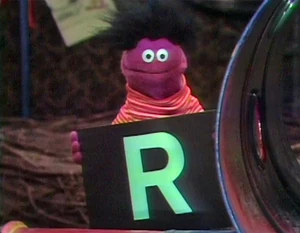
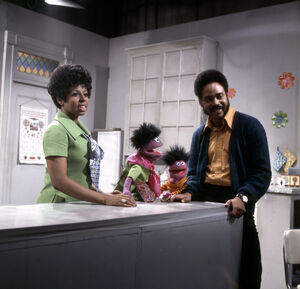
Susan (Loretta Long) and Matt Robinson (Gordon) with Roosevelt and his mother.
Roosevelt Franklin appeared on Sesame Street from Season 1 (1970) to Season 7 (1975). It goes without saying that his name is simply a reversal of that of president Franklin D. Roosevelt. The precocious Roosevelt Franklin attended Roosevelt Franklin Elementary School, where he taught the class as often as not. He taught concepts like family, pride, respect, geography and not drinking poison. Roosevelt was a cool kid who loved to scat, rhyme and sing the blues. His mother was proud of him.
In addition to his elementary school, he had his own stadium, Roosevelt Franklin Stadium, where he coached Headball. Roosevelt has a younger sister, who wishes that she could go to school like he does. [1]
Matt Robinson, who played Gordon during the first three seasons, created the character and performed Roosevelt's voice. [2]
For a while, Roosevelt was considered one of the main characters on Sesame Street. He even had his own record album, The Year of Roosevelt Franklin. Despite significant popularity, he was dropped from the cast following letters complaining of a negative African-American stereotype, and because his rowdy elementary school did not set a good example for children.[3] Roosevelt continued to surface occasionally in storybooks, however, as late as 1996.
In 2009, a behind-the-scenes photograph of guest star Paul Rudd playing with the puppet was featured in Sesame Street: A Celebration - 40 Years of Life on the Street.
Criticism
Roosevelt Franklin was the source of criticism by some African-American intellectuals who scrutinized the character for signs that he was too black, or not black enough.
For example, in a 1973 issue of literary digest Black World, the article "Sesame Street: A Linguistic Detour for Black-Language Speakers" took Sesame to task for the way that black characters on the show spoke: "The fact that Black Language is a legitimate linguistic system is not recognized on Sesame Street... Adherents to the fallacious assumption that poor Black children are verbally destitute, the producers of Sesame Street attempt to eradicate what they perceive as a "communicative deficit" by subjecting their audience to large doses of middle-class verbiage... An analysis of the content of Sesame Street will reveal that only a token effort is made to acknowledge that some Black people speak differently than white people and that this effort, in fact, constitutes a gross misrepresentation of Black Language."
The article took issue with the language used in a sketch in which Roosevelt's mother asks Roosevelt to spell his name:
Sketches
- For sketches at his school, see Roosevelt Franklin Elementary School.
| Picture | Theme / EKA | Description |
|---|---|---|
| Roosevelt Franklin spells his name Episode 0261 |
Susan helps Oscar read the poor handwriting on one envelope (for Oscar's postal service), and helps him deliver it to Roosevelt Franklin. She then helps Roosevelt sing a song about spelling his name. | |
| Headball: Hard Head Henry Harris Episode 0986 |
Hard Head Henry Harris, coached by Roosevelt Franklin, participates in Headball and must answer the question, "Where is bread made?". The headball is held at Roosevelt Franklin Stadium. Audience members include Bert, Guy Smiley, Simon Soundman, Biff, Sully, Grover, Herry Monster and Count von Count. | |
| Headball: Baby Breeze Episode 1146 |
Baby Breeze participates in Headball. |
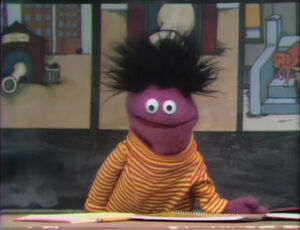
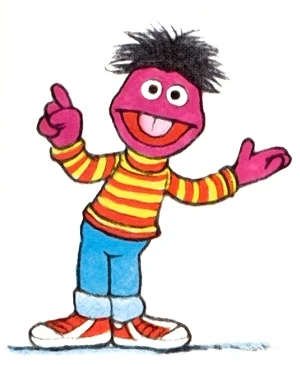
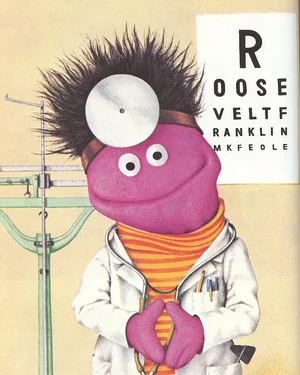
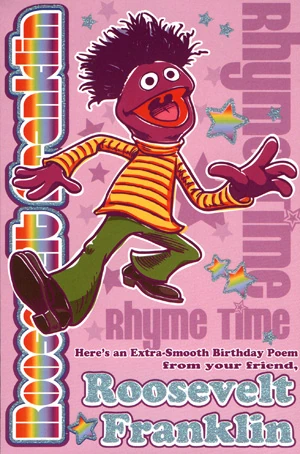
Songs
Book appearances
- The Sesame Street Storybook, inside cover only (1971)
- Sesame Street Finger Puppets (1971)
- The Together Book (1971)
- Bert's Hall of Great Inventions (1972)
- Sherlock Hemlock and the Great Twiddlebug Mystery (1972)
- The Sesame Street 1, 2, 3 Storybook (1973)
- Grover and the Everything in the Whole Wide World Museum (1974)
- The Sesame Street ABC Storybook (1974)
- Big Bird's Busy Book (1975)
- See No Evil, Hear No Evil, Smell No Evil (1975)
- Bert's Big Band Paint-with-Water Book (1976)
- The Sesame Street Postcard Book (1976)
- Paper Doll Players (1976)
- Big Bird's Red Book (1977)
- The Great Cookie Thief (1977)
- Muppets in My Neighborhood (1977)
- The Sesame Street Block Party Coloring Book (1977)
- The Sesame Street Mystery Coloring Book (1977)
- The Sesame Street Bedtime Storybook (1978)
- The Exciting Adventures of Super Grover (1978)
- The Sesame Street Cookbook (1978)
- Cookie Monster's Storybook (1979)
- A Day on Sesame Street (1979)
- Ernie's Work of Art (1979)
- Sesame Stories (1979)
- Down on the Farm with Grover (1980)
- I Can Do It Myself (1980)
- The Sesame Street Dictionary (1980)
- The Sesame Street Pet Show (1980)
- The Count Counts a Party (1981)
- Oscar's Rotten Birthday (1981)
- A Day at School (1982)
- First Day of School (1982)
- Grover Goes to School (1982)
- Everyone Makes Mistakes (1983)
- The Songs of Sesame Street in Poems and Pictures (1983)
- My Sesame Street Yearbook 1984 (1983)
- Sign Language ABC (1985)
- Big Bird Goes to the Doctor (1986)
- Happy Mother's Day! (1989)
- Elmo's Lift-and-Peek Around the Corner Book (1996)
See also
Sources
- ↑ A Day on Sesame Street, Western Publishing, 1979. Drawings by Irra Duga.
- ↑ Children's Television Workshop Season 2 press release, November 1970: "A versatile artist, Robinson created the character Roosevelt Franklin which Muppeteer Jim Henson has translated into an engaging black puppet figure. Robinson has written several songs for Roosevelt and voices the character as well."
- ↑ Borgenicht, David. Sesame Street Unpaved page 135
- ↑ Stewart, Barbara H. "Sesame Street: A Linguistic Detour for Black-Language Speakers", Black World. August 1973.


